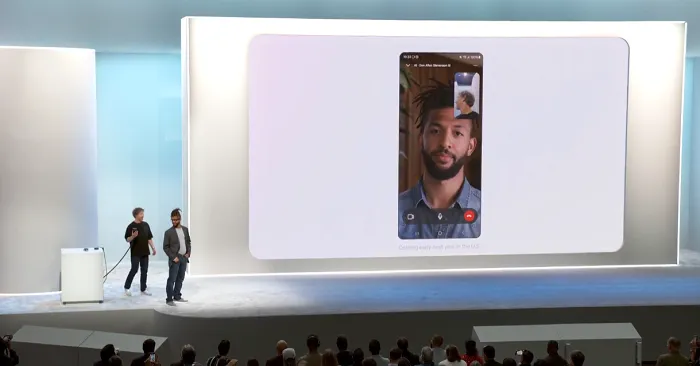For all of the hype round AI, and the plain potential in varied functions, it certain does seem to be social apps are greedy for really beneficial use circumstances.
Or possibly I’m simply not seeing it but, however for me, AI bots that reply within the type of celebrities, or within the voice of celebrities, as per Meta’s newest replace, actually aren’t it.
Meta’s preliminary experiment with celebrity-styled AI chatbots in textual content type didn’t resonate with customers, which led to it lately shutting down that challenge.
As a result of it’s not that attention-grabbing, proper? A chatbot that provides you the impression that you simply’re talking to some celeb isn’t notably participating when you understand that it’s probably not that celeb, or certainly any human in any respect, on the different finish of the dialogue. It’s simply you talking to the Matrix, and the codebase calculating then returning your solutions.
That’s additionally true for celeb voiced bots, as a result of whether or not its dressed up as Billie Eilish, or simply responses hooked up to some generic profile pic, these solutions are nonetheless gonna be the identical. Positive, listening to John Cena reply to random questions goes to be humorous amongst your folks, however that novelty’s going to put on off fairly fast. And once more, then it’s simply you guffawing to your self. Or possibly making an attempt to persuade your self that you simply really are mates with Kristen Bell as her robotic voice rings in your ears.
It’s additionally not social, a minimum of not in the best way that we usually perceive that time period. Social usually refers to human connection, which the entire idea of social media was based upon.
These choices should not social, the truth is they’re the other, in that they invite engagement with no person else.
And whereas, once more, you would possibly have the ability to develop a type of relationship with an AI system (and a few individuals have already got), that additionally appears doubtlessly unhealthy, and never one thing that we ought to be seeking to construct for, a minimum of until we all know the potential risks of such.
However that’s not even the restrict of Meta’s AI bot tasks.
In his Join keynote yesterday, Meta CEO Mark Zuckerberg additionally previewed the subsequent stage of the corporate’s AI character platform, which is able to ultimately allow creators to construct AI variations of themselves in video type.
So you may be video chatting to your favourite celeb, and so they’ll have the ability to reply any query you ask them.
Cool, proper?
Besides, once more, this isn’t really social, in that you simply’re not participating with different individuals, and it’s probably not something in any respect. It’s only a online game, with actual life characters, which is able to more and more look and sound like individuals you acknowledge.
And that’s not what the attract of social media has historically been.
One of many key advantages of social media is that it does allow you to attach with individuals from all walks of life, and celeb connection has performed a giant half in that. Earlier than social media, your probabilities of ever participating along with your favourite stars was slim-to-none, however now, you possibly can ship them a put up or DM, and there’s a barely higher likelihood that they may really acknowledge you.
That’s been a beneficial driver of fan engagement, and constructing an viewers, however quickly, you gained’t know whether or not it was really them, or an AI bot. Which may really erode the entire expertise.
Although human-like bots of this kind have turn out to be common in a single format: reside purchasing streams in China.

The presenters in these examples are all AI-generated bots, which allow manufacturers to promote their merchandise, 24/7, through reside streams on Douyin (the native model of TikTok).
As reported by MIT Know-how Assessment:
“Since 2022, a swarm of Chinese language startups and main tech corporations have been providing the service of making deepfake avatars for e-commerce livestreaming. With only a few minutes of pattern video and $1,000 in prices, manufacturers can clone a human streamer to work 24/7.”
With this, the enterprise merely supplies the script and the product particulars, and the digital streamer will promote issues on their behalf. Extra superior variations may even scan the feedback for sure responses, and interact with viewers, whereas they will additionally change approaches primarily based on what number of viewers they’ve at any given time.
So there’s a demand, in some type, for a lot of these digital doppelgangers. However then once more, reside purchasing hasn’t caught on in Western markets, and it doesn’t seem to be that is going to be the set off that pushes it to the subsequent stage.
Primarily, Meta’s nonetheless throwing AI concepts on the wall, and seeing what sticks. However I simply don’t see how shifting away from the “social” features of its merchandise is a viable technique for future utilization.
Encouraging extra bots pretending to be people looks as if a pathway to a much less participating social media atmosphere. But, on the identical time, Zuck himself lately famous that, in his view:
“Each a part of what we do goes to get modified in a roundabout way [by AI]. [For example] feeds are going to go from – you understand, it was already buddy content material, and now it’s largely creators. Sooner or later, a variety of it’ll be AI generated.”
So Meta believes that increasingly AI-generated content material is coming to our social feeds, a method or one other.
Is {that a} good factor? Will that drive extra engagement?
AI as a sensible assistant that may aid you uncover related solutions is one factor, however AI as an engagement choice? A digital relationship?
That looks like one thing else.

























